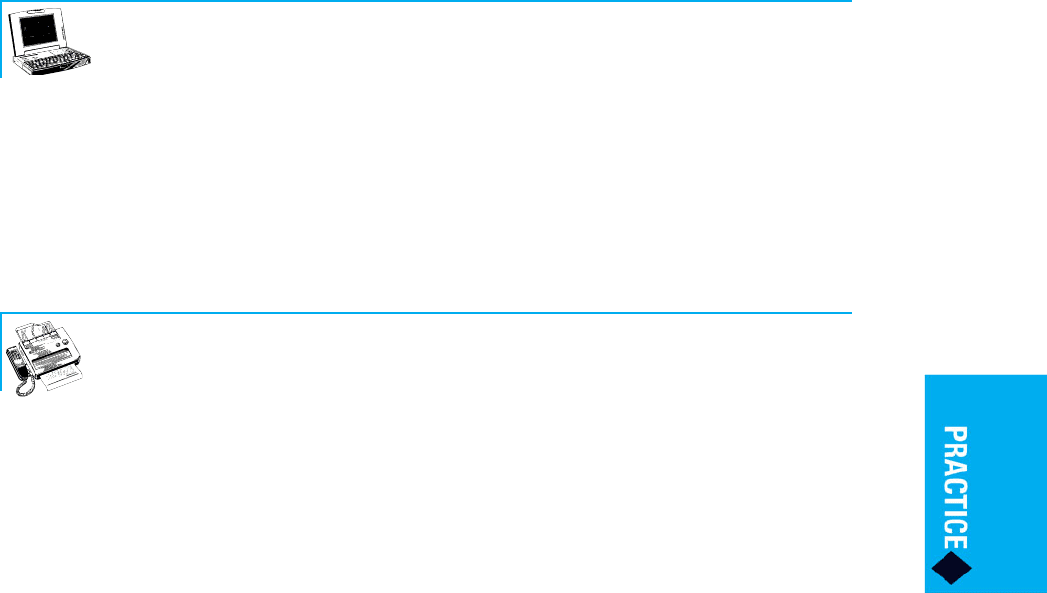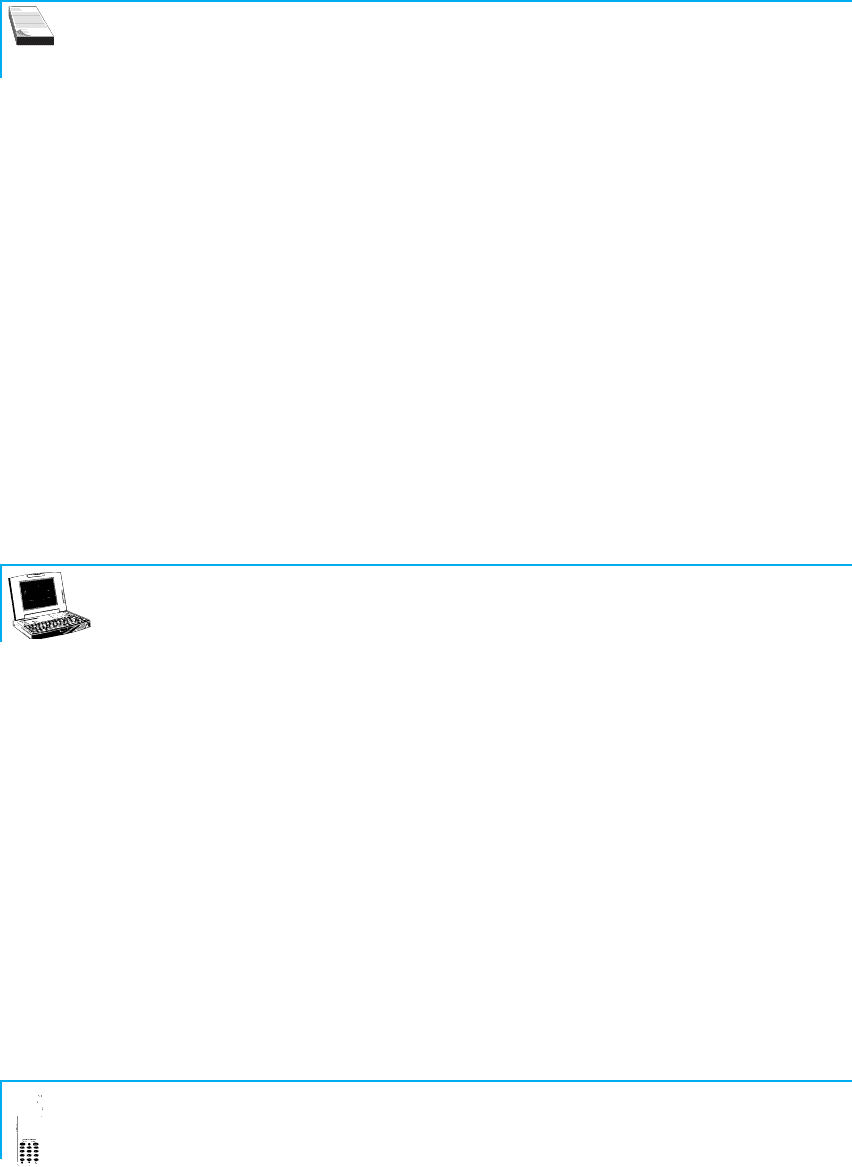Whetten David A., Cameron Kim S. Developing management skills
Подождите немного. Документ загружается.


MANAGING CONFLICT CHAPTER 7 407
philosophy we used to solicit the investments originally, and that’s the approach we
are obligated to maintain.”
Many months passed, and dissension among the managers grew. Mike’s frustration
over the lack of support among the senior partners began to undermine the day-to-day
operations of EPI. He began to criticize detractors in discussions with younger EPI
employees. In addition, he assigned research department employees tasks related to
technological investments, distracting them from investigating more traditional alterna-
tives. He gradually implemented his ideas within his portfolio, which accounted for
approximately 35 percent of EPI’s revenues. This disrupted the operations of other
managers in EPI because the performance of their funds relied on the timely input of the
researchers and other support staff. The other managers bristled when the research
staff began tracking the ROI of the various investments on a chart prominently
displayed on the conference room wall.
Amidst a rapidly spreading undercurrent of tension, one of the founding partners,
Tom Watson, approached Dan one day. Conservative in his ways, Watson was the partner
who walks the office and always has time to stop and chat. He began the conversation.
“Dan, I speak for most of the senior staff when I say that we are very troubled by
Mike’s approach. We’ve expressed ourselves well enough for Mike to understand, but
his actions defy everything we’ve said. He’s a catastrophe just waiting to happen.”
“I can understand your concern, Tom,” replied Dan. “I’m troubled, too. We have
an opportunity to attract new business with some of Mike’s new ideas. And the
younger staff love working on his projects. But he has stirred up a lot of turmoil.”
Tom agreed. “The real issue is that EPI is no longer presenting a unified image.
Mike is willfully defying the stated objectives of our organization. And some of our
oldest clients don’t like that.”
“That’s true, Tom. On the other hand, some of our newer clients are really
encouraged by Mike’s approach—and his track record is extremely impressive.”
“Come on, Dan. You and I both know that many experts feel the market is over-
heating. Mike’s paper profits could quickly be incinerated if the budget and trade
deficits don’t turn around. We can’t stake the reputation of the firm on a few high-flying
technology stocks. Dan, the other senior partners agree. Mike must either conform to
the philosophy and management practices of this organization or else resign.”
Reflecting on the situation, Dan realized he faced the most difficult challenge of
his career. He felt a strong personal investment in helping Mike succeed. Not only had
he hired Mike over the objections of several colleagues; he had personally helped him
“learn the ropes” at EPI. Beyond that, Dan was haunted by his promise to Mike that
he would have the freedom and flexibility to perform the requirements of the position
as he pleased. However, this flexibility had clearly caused problems within EPI.
Finally, bowing to the pressure of his peers, Dan called Mike in for a meeting,
hoping to find some basis for compromise.
DAN: I gather you know the kinds of concerns the senior partners have
expressed regarding your approach.
MIKE: I guess you’ve talked with Tom. Well, we did have a small disagreement
earlier this week.
DAN: The way Tom tells it, you’re willfully defying corporate objectives and being
insubordinate.
MIKE: Well, it’s just like Watson to see progressive change as an attempt to take
away his power.
DAN: It’s not quite that simple, Mike. When we founded EPI, we all agreed that a
conservative stance was best. And right now, with the economic indicators looking
soft, many experts agree that it may still be the best alternative.
408 CHAPTER 7 MANAGING CONFLICT
MIKE: Dan, what are you going to rely on—predictions or performance? These
concerns are just smokescreens to deflect attention away from the sub-par records of
other portfolio managers. Old views need to be challenged and ultimately discarded.
How else are we going to progress and keep up with our competitors?
DAN: I agree we need to change, Mike—but gradually. You have great ideas and
terrific instincts, but you can’t change a 30-year-old firm overnight. You can help me
promote change, but you’re pushing so fast, others are digging in their heels. The
rate of change is just as important as the direction.
MIKE: You’re telling me. And at this rate, it doesn’t make much difference which
direction we’re headed in.
DAN: Come on, Mike. Don’t be so cynical. If you’d just stop rubbing people’s
noses in your performance record and try to see things from their perspective, we
could calm things down around here. Then maybe we could start building consensus.
Mike’s emotions betray his impatience with the pace of the organization; he becomes
agitated.
MIKE: I’ve always admired your judgment, and I value your friendship, but I hon-
estly think you’re kidding yourself. You seem to think you can get this firm to look like
it’s progressive—shrugging off its stodgy image—without taking any risks or ruffling
any feathers. Are you interested in appearance or substance? If you want appear-
ance, then hire a good PR person. If you want substance, then back me up and we’ll
rewrite the record book. Get off the fence, Dan, before your butt’s full of slivers.
DAN: Mike, it simply isn’t that easy. I’m not EPI, I’m simply its caretaker. You
know we make decisions around here by consensus; that’s the backbone of this orga-
nization. To move ahead, the confidence of the others has to be won, especially the
confidence of the seniors. Frankly, your reputation as a maverick makes it hard to fos-
ter confidence in, and loyalty to, your plans.
MIKE: You knew my style when you hired me. Remember how you made it a
point to promise me flexibility and autonomy? I’m not getting that any more, Dan. All
I’m getting is grief, even though I’m running circles around your conservative cronies.
DAN: Well, that may be true. But your flamboyance . . .
MIKE: Oh, yeah. The sports car, the singles lifestyle, the messy office. But, again,
that’s appearance, Dan, not substance. Performance is what counts. That’s what got
me this far, and that’s my ticket out. You know I could walk into any firm in town and
write my own plan.
DAN: Well, there’s no reason to be hasty.
MIKE: Do you honestly believe this can be salvaged? I think not. Maybe it’s
time for me to be moving on. Isn’t that why you called me in here anyway?
Dan, feeling uncomfortable, breaks eye contact and shifts his gaze to the New York
skyline. After a long pause, he continues, still gazing out of the window.
DAN: I don’t know, Mike. I feel I’ve failed. My grand experiment in change has
polarized the office; we’ve got two armies at war out there. On the other hand, you
really have done a good job here. EPI will no doubt lose a good part of its customer
base if you leave. You have a loyal following, with both customers and staff. If you go,
so do they—along with our shot at changing our image.
MIKE: It’s just like you, Dan, to take this problem personally. Blast it, you take
everything personally. Even when I beat you at racquetball. Your heart’s in the right
place—you just can’t ever seem to make the cutthroat hit. You know and I know that
EPI needs a change in image. But it doesn’t appear to be ready for it yet. And I’m cer-
tainly not willing to move slowly.

MANAGING CONFLICT CHAPTER 7 409
DAN: Yeah. Maybe. It’s just hard to give up . . . [long pause]. Well, why don’t we
talk more about this after the reception tonight? Come on over and see Joanie and
the kids. Besides, I’m dying to show off my new boat.
MIKE: What you see in sailing is beyond me. It’s a waste of time, lazily drifting on
gentle breezes.
DAN: Save it for later, “Speed King.” I’ve got to get ready for tonight.
Discussion Questions
1. What are the sources of conflict in this case?
2. What approaches to conflict management are used by the actors in this situation?
How effective was each?
3. Based on the behavioral guidelines for the collaborative approach, how could Dan
have managed this conflict more effectively?

410 CHAPTER 7 MANAGING CONFLICT
EXERCISE FOR DIAGNOSING
SOURCES OF CONFLICT
SSS Software Management Problems
In order to manage conflict between others effectively, it is important to be aware of early
warning signs. It is also important to understand the underlying causes of disagreements.
Conflict that is unmanaged, or managed ineffectively, interferes with work-group perfor-
mance. A key to managing conflict effectively is recognizing it in its early stages and
understanding its roots.
Assignment
Read the memos, faxes, voice mail, and e-mail messages that follow. As you examine each
of these documents, look for evidence of organizational conflicts. Identify the two con-
flicts that you think are most significant for you to address in your role as Chris Perillo.
Begin your analysis of these conflicts by identifying their likely sources or causes. Use
Figure 7.2 as a diagnostic tool for identifying the type of conflict, based on its source and
focus. Prepare to present your analysis, along with supporting evidence from the memos.
Also, share your ideas regarding how this analysis of the causes of conflict would influ-
ence your approach to resolving the conflict.
SSS Software In-Basket Memos, E-mails, Faxes, and Voice Mails
ITEM 1 – E-MAIL
TO: All Employees
FROM: Roger Steiner, Chief Executive Officer
DATE: October 15
I am pleased to announce that Chris Perillo has been appointed as Vice President of
Operations for Health and Financial Services. Chris will immediately assume responsi-
bility for all operations previously managed by Michael Grant. Chris will have end-to-end
responsibility for the design, development, integration, and maintenance of custom soft-
ware for the health and finance/banking industries. This responsibility includes all techni-
cal, financial, and staffing issues. Chris will also manage our program of software
support and integration for the recently announced merger of three large health mainte-
nance organizations (HMOs). Chris will be responsible for our recently announced
project with a consortium of banks and financial firms operating in Tanzania. This project
represents an exciting opportunity for us, and Chris’s background seems ideally suited
to the task.
Chris comes to this position with an undergraduate degree in Computer Science from the
California Institute of Technology and an MBA from the University of Virginia. Chris began as
a member of our technical/professional staff six years ago and has most recently served for
three years as a group manager supporting domestic and international projects for our air-
lines industry group, including our recent work for the European Airbus consortium.
I am sure you all join me in offering congratulations to Chris for this promotion.
SKILL
PRACTICE

MANAGING CONFLICT CHAPTER 7 411
ITEM 2 – E-MAIL
TO: All Managers
FROM: Hal Harris, Vice President, Community and Public Relations
DATE: October 15
For your information, the following article appeared on the front page of the business
section of Thursday’s
Los Angeles Times
.
In a move that may create problems for SSS Software, Michael Grant and Janice Ramos
have left SSS Software and moved to Universal Business Solutions Inc. Industry ana-
lysts see the move as another victory for Universal Business Solutions Inc. in their bat-
tle with SSS Software for share of the growing software development and integration
business. Both Grant and Ramos had been with SSS Software for over seven years.
Grant was most recently Vice President of Operations for all SSS Software’s work in two
industries: health and hospitals, and finance and banking. Ramos brings to Universal
Business Solutions Inc. her special expertise in the growing area of international soft-
ware development and integration.
Hillary Collins, an industry analyst with Merrill Lynch, said “the loss of key staff to a com-
petitor can often create serious problems for a firm such as SSS Software. Grant and
Ramos have an insider’s understanding of SSS Software’s strategic and technical limita-
tions. It will be interesting to see if they can exploit this knowledge to the advantage of
Universal Business Solutions Inc.”
ITEM 3 – E-MAIL
TO: Chris Perillo
FROM: Paula Sprague, Executive Assistant to Roger Steiner
DATE: October 15
Chris, I know that in your former position as a group manager in the Airline Services
Division, you probably have met most of the group managers in the Health and Financial
Services Division, but I thought you might like some more personal information about
them. These people will be your direct reports on the management team.
Group #1
: Bob Miller, 55-year-old white male, married (Anna) with two children and three
grandchildren. Active in local Republican politics. Well regarded as a “hands-off” manager
heading a high-performing team. Plays golf regularly with Mark Mclntyre, John Small,
and a couple of VPs from other divisions.
Group #2
: Wanda Manners, 38-year-old white female, single with one school-age child.
A fitness “nut” and has run in several marathons. Some experience in Germany and
Japan. Considered a hard-driving manager with a constant focus on the task at hand.
Will be the first person to show up every morning.
Group #3
: William Chen, 31-year-old male of Chinese descent, married (Harriet), two
young children from his first marriage. Enjoys tennis and is quite good at it. A rising star in
the company, he is highly respected by his peers as a “man of action” and a good friend.
Group #4
: Leo Jones, 36-year-old white male, married (Janet) with an infant daughter.
Recently returned from paternity leave. Has traveled extensively on projects since he
speaks three languages. Has liked hockey ever since the time he spent in Montreal.
Considered a strong manager who gets the most out of his people.
Group #5
: Mark Mclntyre, 45-year-old white male, married (Mary Theresa) to an execu-
tive in the banking industry. No children. A lot of experience in Germany and Eastern

412 CHAPTER 7 MANAGING CONFLICT
Europe. Has been writing a mystery novel. Has always been a good “team player,” but
several members of his technical staff are not well respected and he hasn’t addressed
the problem.
Group #6
: John Small, 38-year-old white male, recently divorced. Three children living
with his wife. A gregarious individual who likes sports. He spent a lot of time in Mexico
and Central America before he came to SSS Software. Recently has been doing mostly
contract work with the federal government. An average manager, has had some trouble
keeping his people on schedule.
Group #7
: This position vacant since Janice Ramos left. Roger thinks we ought to fill this
position quickly. Get in touch with me if you want information on any in-house candidates
for any position.
Group #8
: Marcus Harper, 42-year-old African American male, married (Tamara) with two
teenage children. Recently won an award in a local photography contest. Considered a
strong manager who gets along with peers and works long hours.
Customer Services
: Armand Marke, 38-year-old male, divorced. A basketball fan.
Originally from Armenia. Previously a group manager. Worked hard to establish the
Technical Services Phone Line, but now has pretty much left it alone.
Office Administrator
: Michelle Harrison, 41-year-old white female, single. Grew up on a
ranch and still rides horses whenever she can. A strict administrator.
There are a number of good folks here, but they don’t function well as a management
team. I think Michael played favorites, especially with Janice and Leo. There are a few
cliques in this group, and I’m not sure how effectively Michael dealt with them. I expect
you will find it a challenge to build a cohesive team.
ITEM 4 – E-MAIL
TO: Chris Perillo
FROM: Wanda Manners, Group 2 Manager
DATE: October 15
CONFIDENTIAL AND RESTRICTED
Although I know you are new to your job, I feel it is important that I let you know about
some information I just obtained concerning the development work we recently
completed for First National Investment. Our project involved the development of asset
management software for managing their international funds. This was a very complex
project due to the volatile exchange rates and the forecasting tools we needed to develop.
As part of this project, we had to integrate the software and reports with all their exist-
ing systems and reporting mechanisms. To do this, we were given access to all of their
existing software (much of which was developed by Universal Business Solutions Inc.).
Of course, we signed an agreement acknowledging that the software to which we were
given access was proprietary and that our access was solely for the purpose of our sys-
tem integration work associated with the project.
Unfortunately, I have learned that some parts of the software we developed actually
“borrow” heavily from complex application programs developed for First National
Investment by Universal Business Solutions Inc. It seems obvious to me that one or more
of the software developers from Group 5 (that is, Mark Mclntyre’s group) inappropriately
“borrowed” algorithms developed by Universal Business Solutions Inc. I am sure that

MANAGING CONFLICT CHAPTER 7 413
doing so saved us significant development time on some aspects of the project. It seems
very unlikely that First National Investment or Universal Business Solutions Inc. will ever
become aware of this issue.
Finally, First National Investment is successfully using the software we developed and is
thrilled with the work we did. We brought the project in on time and under budget. You
probably know that they have invited us to bid on several other substantial projects.
I’m sorry to bring this delicate matter to your attention, but I thought you should know
about it.
ITEM 5A – E-MAIL
TO: Chris Perillo
FROM: Paula Sprague, Executive Assistant to Roger Steiner
DATE: October 15
RE: Letter from C.A.R.E. Services (copies attached)
Roger asked me to work on this C.A.R.E. project and obviously wants some fast action.
A lot of the staff are already booked solid for the next couple of weeks. I knew that Elise
Soto and Chu Hung Woo have the expertise to do this system and when I checked with
them, they were relatively free. I had them pencil in the next two weeks and wanted to
let you know. Hopefully, it will take a “hot potato” out of your hands.
ITEM 5B – Copy of Fax
C.A.R.E.
Child and Adolescent Rehabilitative and Educational Services
A United Way Member Agency
200 Main Street
Los Angeles, California 90230
DATE: October 11
Roger Steiner, CEO
SSS Software
13 Miller Way
Los Angeles, California 90224
Dear Roger,
This letter is a follow-up to our conversation after last night’s board meeting. I appreciated
your comments during the board meeting about the need for sophisticated computer
systems in nonprofit organizations and I especially appreciate your generous offer of help
to have SSS Software provide assistance to deal with the immediate problem with our
accounting system. Since the board voted to fire the computer consultant, I am very
worried about getting our reports done in time to meet the state funding cycle.
Thanks again for your offer of help during this crisis.
Sincerely yours,
Janice Polocizwic
Janice Polocizwic
Executive Director

414 CHAPTER 7 MANAGING CONFLICT
ITEM 5C – COPY OF A LETTER
SSS SOFTWARE
13 Miller Way
Los Angeles, CA 90224
DATE: October 12
Janice Polocizwic
Executive Director, C.A.R.E. Services
200 Main Street
Los Angeles, California 90230
Dear Janice,
I received your fax of October 11. I have asked Paula Sprague, my executive assistant, to
line up people to work on your accounting system as soon as possible. You can expect
to hear from her shortly.
Sincerely,
Roger Steiner
Roger Steiner
cc: Paula Sprague, Executive Assistant
ITEM 6 – E-MAIL
TO: Michael Grant
FROM: Harry Withers, Group 6 Technical Staff
DATE: October 12
PERSONAL AND CONFIDENTIAL
Our team is having difficulty meeting the submission deadline of November 5 for the
Halstrom project. Kim, Fred, Peter, Kyoto, Susan, Mala, and I have been working on the
project for several weeks, but we are experiencing some problems and may need addi-
tional time. I hesitate to write this letter, but the main problem is that our group manager,
John Small, is involved in a relationship with Mala. Mala gets John’s support for her ideas
and brings them to the team as required components of the project. Needless to say, this
has posed some problems for the group. Mala’s background is especially valuable for
this project, but Kim and Fred, who have both worked very hard on the project, do not
want to work with her. In addition, one member of the team has been unavailable
recently because of child-care needs. Commitment to the project and team morale have
plummeted. However, we’ll do our best to get the project finished as soon as possible.
Mala will be on vacation the next two weeks, so I’m expecting that some of us can com-
plete it in her absence.
ITEM 7 – VOICE MAIL MESSAGE
Hello, Michael. This is Jim Bishop of United Hospitals. I wanted to talk with you about
the quality assurance project that you are working on for us. When Jose Martinez first
started talking with us, I was impressed with his friendliness and expertise. But
recently, he doesn’t seem to be getting much accomplished and has seemed distant

MANAGING CONFLICT CHAPTER 7 415
and on-edge in conversations. Today, I asked him about the schedule and he seemed
very defensive and not entirely in control of his emotions. I am quite concerned about
our project. Please give me a call.
ITEM 8 – VOICE MAIL MESSAGE
Hi, Michael. This is Armand. I wanted to talk with you about some issues with the
Technical Services Phone Line. I’ve recently received some complaint letters from
Phone Line customers whose complaints have included long delays while waiting for a
technician to answer the phone, technicians who are not knowledgeable enough to
solve problems, and, on occasion, rude service. Needless to say, I’m quite concerned
about these complaints.
I believe that the overall quality of the Phone Line staff is very good, but we continue to
be understaffed, even with the recent hires. The new technicians look strong, but are
working on the help-line before being fully trained. Antolina, our best tech, often brings
her child to work, which is adding to the craziness around here.
I think you should know that we’re feeling a lot of stress here. I’ll talk with you soon.
ITEM 9 – VOICE MAIL MESSAGE
Hi, Chris, it’s Pat. Congratulations on your promotion. They definitely picked the right per-
son. It’s great news—for me, too. You’ve been a terrific mentor so far, so I’m expecting
to learn a lot from you in your new position. How about lunch next week?
ITEM 10 – VOICE MAIL MESSAGE
Chris, this is Bob Miller. Just thought you’d like to know that John’s joke during our plan-
ning meeting has disturbed a few of the women in my group. Frankly, I think the thing’s
being blown out of proportion, especially since we all know this is a good place for both
men and women to work. Give me a call if you want to chat about this.
ITEM 11 – VOICE MAIL MESSAGE
Hello. This is Lorraine Adams from Westside Hospital. I read in today’s
Los Angeles
Times
that you will be taking over from Michael Grant. We haven’t met yet, but your divi-
sion has recently finished two large million-dollar projects for Westside. Michael Grant
and I had some discussion about a small conversion of a piece of existing software to be
compatible with the new systems. The original vendor had said that they would do the
work, but they have been stalling, and I need to move quickly. Can you see if Harris
Wilson, Chu Hung Woo, and Elise Soto are available to do this work as soon as possible?
They were on the original project and work well with our people.
Um . . . (long pause) I guess I should tell you that I got a call from Michael offering to do
this work. But I think I should stick with SSS Software. Give me a call.

416 CHAPTER 7 MANAGING CONFLICT
ITEM 12 – VOICE MAIL MESSAGE
Hi, Chris, this is Roosevelt Moore calling. I’m a member of your technical/professional
staff. I used to report to Janice Ramos, but since she left the firm, I thought I’d bring my
concerns directly to you. I’d like to arrange some time to talk with you about my experi-
ences since returning from six weeks of paternity leave. Some of my major responsibil-
ities have been turned over to others. I seem to be out of the loop and wonder if my
career is at risk. Also, I am afraid that I won’t be supported or seriously considered for
the opening created by Janice’s departure. Frankly, I feel like I’m being screwed for tak-
ing my leave. I’d like to talk with you this week.
ITEM 13 – E-MAIL
TO: Michael Grant
FROM: Jose Martinez, Group 1 Technical Staff
DATE: October 12
I would like to set up a meeting with you as soon as possible. I suspect that you will get
a call from Jim Bishop of United Hospitals and want to be sure that you hear my side of
the story first. I have been working on a customized system design for quality assurance
for them using a variation of the J-3 product we developed several years ago. They had
a number of special requirements and some quirks in their accounting systems, so I
have had to put in especially long hours. I’ve worked hard to meet their demands, but
they keep changing the ground rules. I keep thinking, this is just another J-3 I’m working
on, but they have been interfering with an elegant design I have developed. It seems I’m
not getting anywhere on this project. Earlier today, I had a difficult discussion with their
Controller. He asked for another major change. I’ve been fighting their deadline and think
I am just stretched too thin on this project. Then Jim Bishop asked me if the system was
running yet. I was worn out from dealing with the Controller, and I made a sarcastic
comment to Jim Bishop. He gave me a funny look and just walked out of the room.
I would like to talk with you about this situation at your earliest convenience.
ITEM 14 – E-MAIL
TO: Chris Perillo
FROM: John Small, Group 6 Manager
DATE: October 15
Welcome aboard, Chris. I look forward to meeting with you. I just wanted to put a bug
in your ear about finding a replacement for Janice Ramos. One of my technical staff,
Mala Abendano, has the ability and drive to make an excellent group manager. I have
encouraged her to apply for the position. I’d be happy to talk with you further about this,
at your convenience.
ITEM 15 – E-MAIL
TO: Chris Perillo
FROM: Paula Sprague, Executive Assistant to Roger Steiner
DATE: October 15
